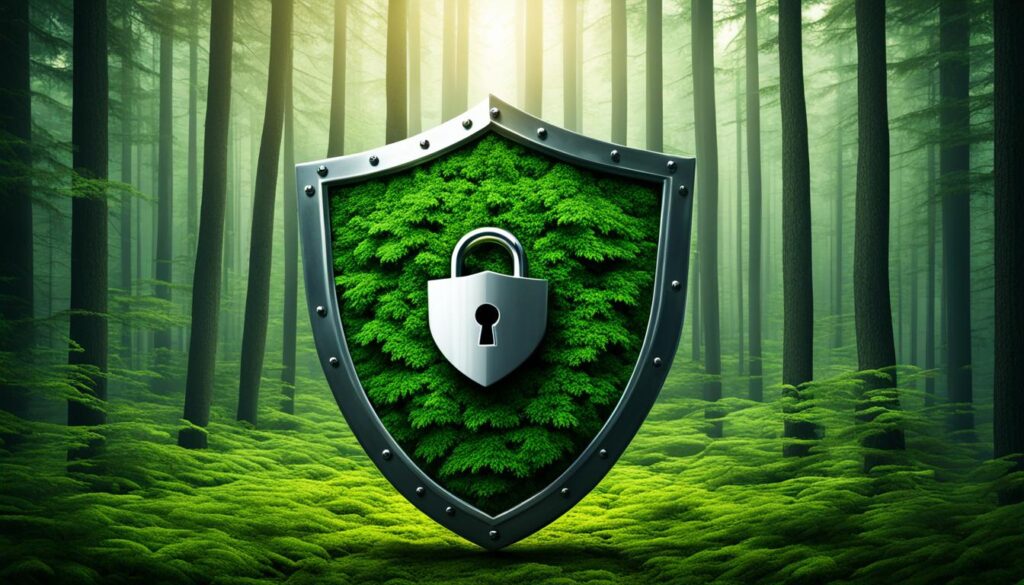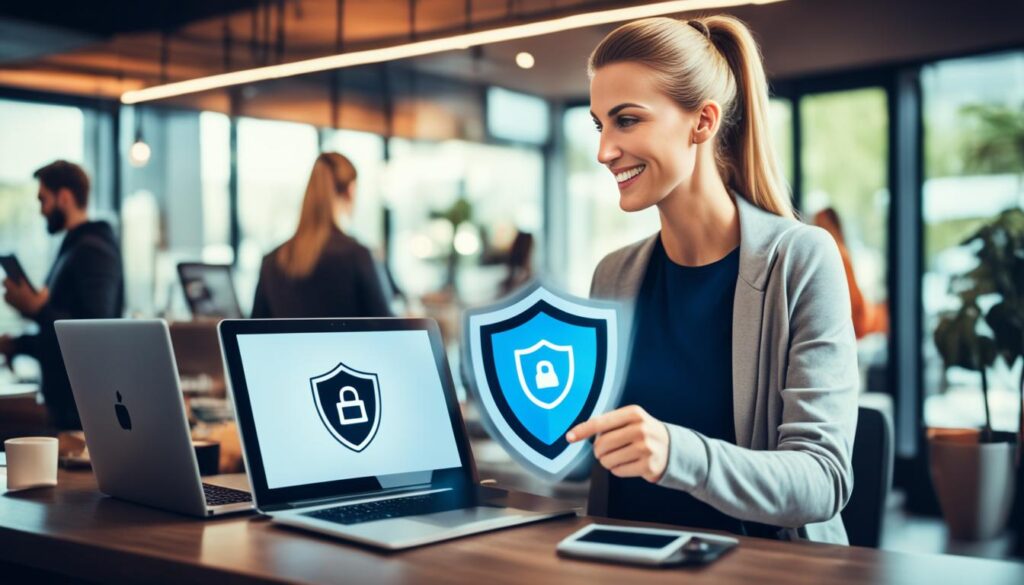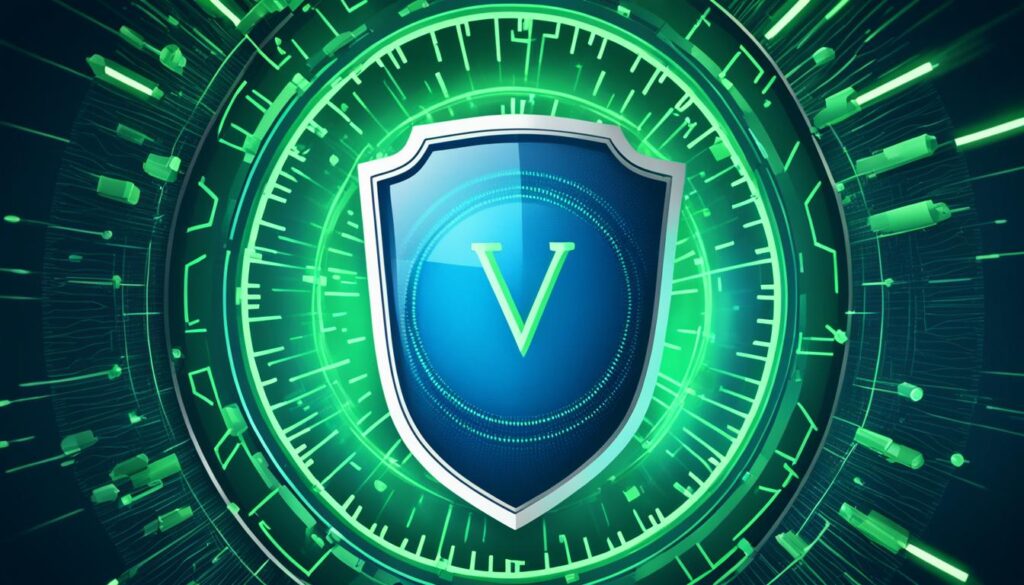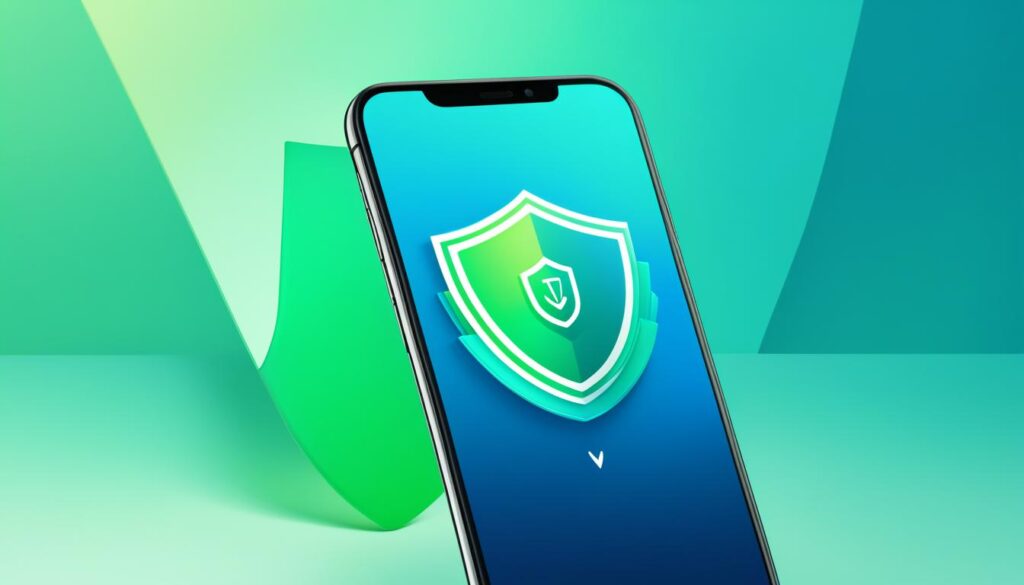Being online means thinking about privacy and security a lot. I’ve started looking into what a “no-logs policy” means for VPNs. When a VPN has a no-logs policy, it doesn’t keep track of what I do online. This includes the sites I visit, what I download, and other private information. It keeps my actions private as I browse the web.
A VPN with a no-logs policy hides my digital tracks. My VPN provider can’t see my browsing history, downloads, or app usage. This is vital for keeping my online activities private. It changes my IP address and adds a protective layer to my connection. So, I’m safe and hidden, even on public Wi-Fi.
Key Takeaways
- A no-logs policy ensures that a VPN provider does not store any records of your online activities.
- It provides complete anonymity and privacy while browsing the internet.
- With a no-logs VPN, your provider cannot see what you do online, including websites visited, files downloaded, or apps used.
- No-logs VPNs are essential for protecting your online privacy and security.
- They help you stay anonymous by masking your IP address and encrypting your internet connection.
Introduction to No-Logs VPNs
In today’s world, keeping our online activities private is very important. Our personal details and what we look at online can be seen by others. This includes cybercriminals and those who watch what we do online. To help us, virtual private networks (VPNs) keep our internet use safe.
Why Online Privacy Matters
When we’re online, what we do or buy can tell a lot about us. This info can be used in bad ways by some people. So, keeping what we do online private is key. It protects our names, our money details, and the way we share our thoughts on the web.
Since the internet is part of everything we do now, protecting our online lives is very important. It’s all about keeping our personal stuff safe when we’re online.
The Role of VPNs in Securing Online Activity
VPNs work to keep the internet safer. They do this by making your internet connection secret. They also hide where you’re really connecting from. This makes it hard for others to pry into what you’re doing online.
Even though standard VPNs are helpful, they’re not foolproof. This is where no-logs VPNs step in. They offer an extra layer of protection. This means your VPN company won’t keep any records of what you do online, like your activities, how you protect your data, and when you connect remotely.
VPN FAQs
VPNs are now a must-have for online users wanting to boost their . But, questions and confusion about them still exist. This part plans to answer some main VPN-related questions, highlighting the importance of a and essential VPN provider features.
Many worry about VPNs keeping logs, which is noting user actions and connection details. A is vital for keeping your online steps truly private and safe. VPN companies without your browsing history, downloads, and important data logs can’t give your data away, even if legally asked or if their system is breached.
Picking a VPN means looking for providers that had their no-logs rules checked by independent parties. ExpressVPN stands out by sticking to high user privacy standards with its . They often check their practices with third-party audits to show they don’t store user actions.
Besides a strong no-logs policy, good VPNs should have top-notch encryption, many servers in various places, and advanced security options like and . With these in mind, you ensure your VPN keeps your data safe and offers a smooth experience.
Clearly, VPNs are vital for securing your in the digital age. Knowing key VPN features and the significance of a no-logs policy helps make a wise choice. Choose a VPN service that caters to your and requirements.
Understanding Different Types of Logs
Knowing about VPN logs is important. They can affect your online privacy and safety. So, choosing a VPN that doesn’t keep logs is key.
Activity Logs
Activity logs track what you do online with a VPN. They may note the websites you go to. And they might also record the files you download or which apps you use.
A VPN without activity logs keeps your online privacy safe. This means your VPN provider doesn’t keep or share this private information.
Connection Logs
Connection logs, on the other hand, note your VPN connection itself. They record the time, date, and the IP address you used. Some logging here can be required for technical reasons.
But a real no-logs VPN won’t keep much of this information. This is to protect your internet security and keep your browsing anonymous.
Aggregated Logs
Aggregated logs show how a VPN is used overall. They include the total data used and the connections made. These logs don’t have any details that can identify you.
They help VPNs improve without risking your data protection. Yet, a good no-logs VPN will be clear about any aggregated logging it does. This is to make sure your info and internet access are still private.
The Importance of a Strict No-Logs Policy
Today, the internet poses risks to our privacy. A VPN without logs is crucial. It means your online actions aren’t stored. This keeps your browsing private and your connections safe.
Protecting Your Online Privacy
With no logs, a VPN company can’t be forced to share your data. This keeps your privacy intact, even if authorities come knocking. It makes sure your VPN stays a true safeguard for your info and actions online.
Safeguarding Against Data Breaches
If a VPN service faces a hack, choosing one with a no-logs policy is wise. This way, your data can’t be stolen. It adds a strong layer of security, protecting your details from getting into the wrong hands.
How a No-Logs VPN Protects You
A no-logs VPN is top-notch for guarding your online privacy and security. It keeps your internet activities private and untrackable. This kind of VPN is great at keeping your browsing history away from prying eyes.
Encryption and IP Masking
It uses strong encryption to make your online connection safe. This stops others from spying on what you do online. No hackers, ISPs, or government agencies can see your info.
Your IP address is also hidden. This prevents anyone from knowing where you are. It keeps your online life private and safe.
No Data Retention
What makes a no-logs VPN stand out is it doesn’t keep your browsing history. That’s right, it keeps no records of what you do. This ensures your browsing is truly anonymous and secure.
It wraps up your connection with encryption, hides your IP, and doesn’t track what you do. A no-logs VPN is key for staying secure online and bypassing location restrictions. It’s essential for staying safe and private in the digital world today.
ExpressVPN’s No-Logs Commitment
ExpressVPN leads the VPN industry with a strong focus on user privacy. It is well-known for its strict no-logs policy. This policy has been checked by respected security firms and found to be true.
TrustedServer Technology
ExpressVPN uses a special technology called TrustedServer. This technology makes sure no logs are kept. Everything is stored in RAM and deleted each time the server restarts. This means your online actions are kept private.
Third-Party Audits and Verifications
ExpressVPN doesn’t just say they protect your privacy – they prove it. Their dedication to keeping no logs has been confirmed by many third-party audits. These checks make sure they really aren’t keeping track of what you do online. It shows that ExpressVPN is a VPN provider you can trust.

Choosing a Reputable No-Logs VPN Provider
When you’re picking a no-logs VPN, focus on how clear they are about privacy. A good one will be open about not keeping any records of what you do online. They should state clearly in their policy that they won’t store your browsing history or any other activity.
Transparent Privacy Policies
Make sure the VPN’s privacy policy is easy to find and easy to understand. It should clearly explain how they handle your data without jargon. A trustworthy VPN won’t keep track of what you do online and will tell you exactly how they protect your privacy. This openness is crucial for trusting them with your private information.
Jurisdiction and Legal Protections
The country a VPN is in affects the legal safety of your data. It’s best if the VPN operates in a place with strict data privacy laws. In such locations, laws often keep the government from forcing the VPN to share your data. This setup ensures your online actions and privacy are shielded from government eyes or other restrictions.
Common Use Cases for No-Logs VPNs
No-logs VPNs help keep your online activities private and secure. They are great for protecting online banking or getting around internet restrictions. These VPNs make sure no one traces what you do online.
Many use a no-logs VPN for work or school from home. It’s more important now to keep data safe. A no-logs VPN hides your work or study activities, like video calls or file sharing, from prying eyes.
They’re also good for seeing content that’s normally blocked. If you want to watch shows from other countries or visit sites and apps that are usually off-limits, a no-logs VPN is what you need. It helps you stay connected and informed online.
For people speaking out about politics or social issues, no-logs VPNs offer a shield online. They keep your identity hidden, protecting you from people tracking your actions. This is especially important when discussing topics that might bring unwanted attention.
No-logs VPNs are key for anyone caring about privacy, safety, and freedom on the internet. They’re useful for keeping personal data safe, unlocking online content, or voicing your views. With a no-logs VPN, you can explore the internet without worry.

Debunking Myths About No-Logs VPNs
The need for online privacy and security is greater than ever. This has made no-logs VPNs very popular. Despite this, many myths and misconceptions are still around. Let’s talk about some of these and set the record straight.
Many believe no-logs VPNs give you complete anonymity. While they are very good for privacy, absolute anonymity is a hard target to hit. Things like DNS leaks can still show who you are. Choosing a trusted no-logs VPN service is key to protecting yourself online.
Some say no-logs VPNs are for doing things that are wrong. But they are also great for everyday uses. They keep your online actions private, which is important for protecting your freedom over the internet. This includes safe online shopping and accessing content from abroad.
Others claim they’re not needed for daily internet use. But with the rising risks of data leaks and online spying, using a no-logs VPN is a smart move. It safeguards all your online actions, no matter what you’re doing. Debunking these myths helps people better understand their options for staying safe online.



